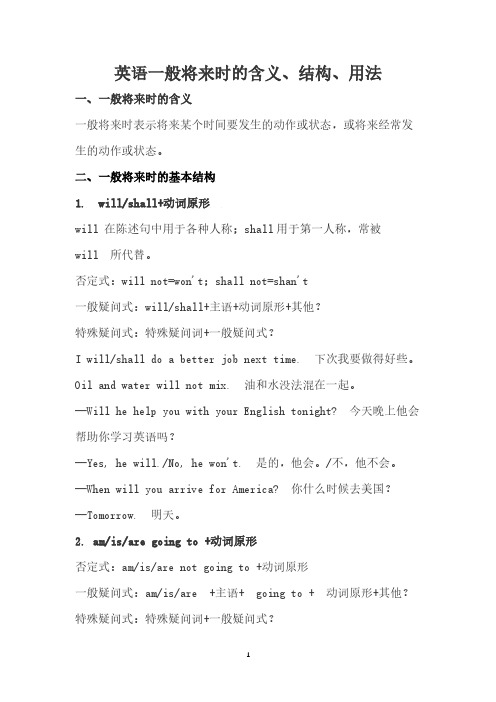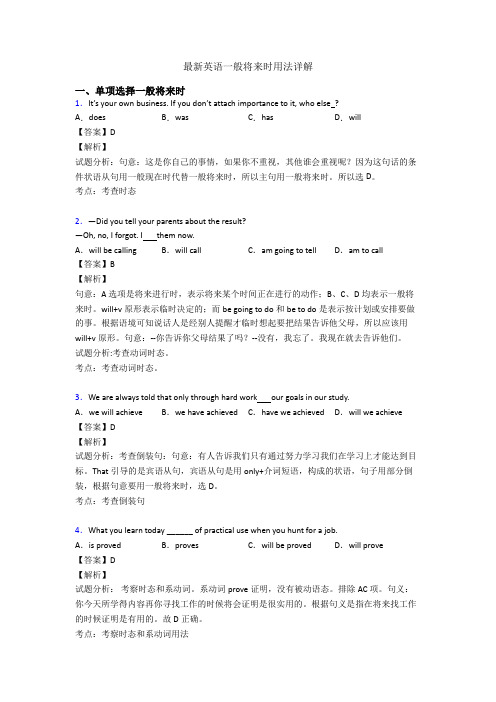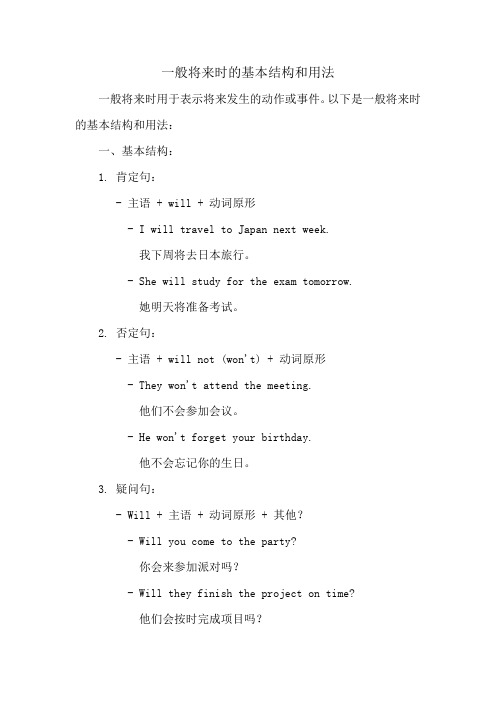【英语】英语一般将来时用法详解
英语语法一般将来时的含义、结构、用法

英语一般将来时的含义、结构、用法一、一般将来时的含义一般将来时表示将来某个时间要发生的动作或状态,或将来经常发生的动作或状态。
二、一般将来时的基本结构1. will/shall+动词原形will 在陈述句中用于各种人称;shall用于第一人称,常被will 所代替。
否定式:will not=won't;shall not=shan't一般疑问式:will/shall+主语+动词原形+其他?特殊疑问式:特殊疑问词+一般疑问式?I will/shall do a better job next time. 下次我要做得好些。
Oil and water will not mix. 油和水没法混在一起。
—Will he help you with your English tonight? 今天晚上他会帮助你学习英语吗?—Yes, he will./No, he won't. 是的,他会。
/不,他不会。
—When will you arrive for America? 你什么时候去美国?—Tomorrow. 明天。
2. am/is/are going to +动词原形否定式:am/is/are not going to +动词原形一般疑问式:am/is/are +主语+ going to + 动词原形+其他?特殊疑问式:特殊疑问词+一般疑问式?He is going to spend his holidays in London. 他打算在伦敦度假。
Look at the dark clouds. There is going to be a storm. 看那乌云,快要下雨了。
Is he going to collect any data for us? 他会帮我们收集数据吗?What are you going to do tomorrow? 明天你打算作什么?三、一般将来时的用法will+动词原形与am/is/are going to +动词原形的用法虽然都表示将来发生动作或情况,一般情况下能互换。
最新英语一般将来时用法详解

最新英语一般将来时用法详解一、单项选择一般将来时1.It’s your own business. If you don’t attach importance to it, who else ?A.does B.was C.has D.will【答案】D【解析】试题分析:句意:这是你自己的事情,如果你不重视,其他谁会重视呢?因为这句话的条件状语从句用一般现在时代替一般将来时,所以主句用一般将来时。
所以选D。
考点:考查时态2.—Did you tell your parents about the result?—Oh, no, I forgot. I them now.A.will be calling B.will call C.am going to tell D.am to call【答案】B【解析】句意:A 选项是将来进行时,表示将来某个时间正在进行的动作;B、C、D均表示一般将来时。
will+v原形表示临时决定的;而be going to do和be to do是表示按计划或安排要做的事。
根据语境可知说话人是经别人提醒才临时想起要把结果告诉他父母,所以应该用will+v原形。
句意:--你告诉你父母结果了吗?--没有,我忘了。
我现在就去告诉他们。
试题分析:考查动词时态。
考点:考查动词时态。
3.We are always told that only through hard work our goals in our study.A.we will achieve B.we have achieved C.have we achieved D.will we achieve 【答案】D【解析】试题分析:考查倒装句:句意:有人告诉我们只有通过努力学习我们在学习上才能达到目标。
That引导的是宾语从句,宾语从句是用only+介词短语,构成的状语,句子用部分倒装,根据句意要用一般将来时,选D。
一般将来时的基本结构和用法

一般将来时的基本结构和用法
一般将来时用于表示将来发生的动作或事件。
以下是一般将来时的基本结构和用法:
一、基本结构:
1. 肯定句:
- 主语 + will + 动词原形
- I will travel to Japan next week.
我下周将去日本旅行。
- She will study for the exam tomorrow.
她明天将准备考试。
2. 否定句:
- 主语 + will not (won't) + 动词原形
- They won't attend the meeting.
他们不会参加会议。
- He won't forget your birthday.
他不会忘记你的生日。
3. 疑问句:
- Will + 主语 + 动词原形 + 其他?
- Will you come to the party?
你会来参加派对吗?
- Will they finish the project on time?
他们会按时完成项目吗?
二、用法:
- 表示将来发生的动作或事件。
- 表示预测、承诺、意图、计划等将来的行为或状态。
- 通常与表示将来时间的时间状语连用,如 tomorrow, next week, in the future 等。
值得注意的是,一般将来时通常用于与将来相关的动作和事件,而对于已经计划或安排好的未来事件,可以使用 "be going to" 结构。
【英语】英语一般将来时用法详解

一、单项选择一般将来时
1.---Do you have any special plan for this weekend?
---Yes. I _____ my daughter to Disneyland.
A.am going to takeB.takeC.have takenD.would take
15.—How long on earth shall I have to wait?
—Sorry, sir. Just a minute. There ________ a table available.
A.isB.wasC.will beD.has been
【答案】C
【解析】
考查动词时态。句意为:我究竟要等多长时间?对不起,先生。再等一会儿,马上就有空桌子了。由语境可知,此处应用将来时,表示“将要有张桌子”。故答案选C。
注:表示请求、建议或征求对方意见时,用Would you…?比用Will you…?更婉转。如:
Will/Would you please keep the door open?请让门开着好吗?
Will/Would you go with me?你愿意和我一起去吗?
(2)表示真理或习惯:惯于,总是。如:
考点:考查时态
8.China's present environment situation is from bad to worse and if we _________ now toprotect the environment, we’ll live to regret it.
A.hadn’t actedB.haven’t actedC.don’t actD.won’t act
英语一般将来时

英语一般将来时英语一般将来时,又称为未来时态,是用来表示将来会发生的动作、事件或状态的一种时态。
它的构成通常由"will" 或 "be going to" 加上动词原形来表示。
下面将详细介绍英语一般将来时的用法。
一、"will"的用法:1. 表示将来的决心、意图、打算或做出的决定。
例如:I will help you with your homework after dinner.(晚饭后我会帮你做作业。
)2. 表示对将来的预测、推测或猜测。
例如:It will rain tomorrow.(明天会下雨。
)3. 表示对将来的自然趋势、发展或趋势。
例如:Technology will continue to advance in the future.(科技将来会继续发展。
)4. 表示对将来的保证、允诺、请求或建议。
例如:I promise I will be on time for the meeting.(我保证会准时参加会议。
)二、"be going to"的用法:1. 表示对将来已经计划或决定好的事情。
例如:I am going to visit my grandparents this weekend.(这个周末我打算去看望我的祖父母。
)2. 表示对将来可能发生的事情有一种预见或判断。
例如:Look at those dark clouds. It's going to rain.(看那些乌云,将要下雨了。
)3. 表示以现有证据或迹象预测未来。
例如:She's been studying very hard. She's going to pass the exam.(她一直学得很努力,她一定会通过考试的。
)三、注意事项:1. 一般将来时中的时间状语词可以是今天、明天、以后、将来、下个月等表示将来的时间状语词。
【备战高考】英语一般将来时用法详解

【备战高考】英语一般未来时用法详解【备战高考】英语一般未来时用法详解一、单项选择一般未来时1.The purpose of education be to provide students with a value system–not to preparethem for a specific job.A. will B. should C. could D. may【答案】 A【分析】B观察神态动词。
句意:教育的目的是供应给学生一个有价值的系统,而不是为特定的工作进行准备。
Should 表示应当。
2.If my brother doesn’ t go to the evening party, .A. neither do I B. I will either C. either will I D. nor will I【答案】 D【分析】试题剖析:观察倒装句:句意:假如我弟弟不去晚会,我也不去。
Neither/Nor+ 倒装句,表示“ 也不是”,由于 if 条件句用一般此刻时,取代一般未来时,因此主句是一般未来时,选 D。
考点:观察倒装句3.— You’ ve left the light on.— Oh, so I have. _____ and turn it off.A. I go B. I ’ ve gone C. I ’ ll go D. I ’ m going【答案】 C【分析】试题剖析:观察时态:句意:--你向来把灯开着。
--哦,是的,我立刻去,把它关了。
这里用一般未来时, CD 都能够表示一般未来时,will do 能够表示暂时决定,be going to do 打算做,选 C。
考点:观察时态4. - Will you be available at three o'clock tomorrow afternoon?- No. I ______ a lecture then.A. are attending B. will have attended C. will attend D. will be attending【答案】 D【分析】试题剖析:观察动词时态。
初中英语一般将来时专项语法讲解
初中英语一般将来时专项语法讲解-CAL-FENGHAI.-(YICAI)-Company One1一般将来时主要构成形式一般将来时表示将来某个时间要发生的动作,事情或存在的状态,也表示将来经常或反复发生的动作或事情。
1)will/shall+动词原形 shall用于第一人称,常被will 所代替。
will 在陈述句中用于各人称,在征求意见时常用于第二人称。
will not=won't shall not=shan't例如:Which paragraph shall I read first 我先读哪一段呢Will you be at home at seven this evening 今晚七点回家好吗2) be going to +不定式,表示将来。
a. 主语的意图,即将做某事。
例如:What are you going to do tomorro w 明天打算作什么呢b. 计划,安排要发生的事。
例如:The play is going to be produced next month。
这出戏下月开播。
c. 有迹象要发生的事。
例如:Look at the dark clouds, there is going to b e a storm. 看那乌云,快要下雨了。
3) be +不定式表将来,按计划或正式安排将发生的事。
例如:We are to discuss the report next Saturday.我们下星期六讨论这份报告。
4) be about to +不定式,意为马上做某事。
例如:He is about to leave for Beijing. 他马上要去北京。
注意:be about to do 不能与tomorrow, next week 等表示明确将来时的时间状语连用。
Notice:be to和be going tobe to 表示客观安排或受人指示而做某事,be going to 表示主观的打算或计划。
英语动词时态用法归纳:一般将来时
英语动词时态用法归纳:一般将来时一、一般将来时的构成一般将来时的由s hall / will+ 动词原形构成。
二、一般将来时的基本用法(1) 表示单纯的将要发生的动作或情况。
常与表示将来的时间状语连用。
如:Tomorrow will be Sunday. 明天是星期天。
They say that it will rain. 他们说要下雨。
I’ll be thirty-seven on my next birthday. 到下次生日,我就三十七岁了。
We won’t be free tonight. 今晚我们没空。
(2) 也可以表示临时决定要做的事。
如:—I thought I asked you to sweep the floor.—O h, I’m sorry. Mother, I will do it right now.—我原以为我让你扫地了。
—噢,对不起,妈妈,我就做。
—You have left the door open.—O h, so I have. I’ll go and lock it.—你忘了锁门。
—哦,是的。
我就去。
(3) 有时虽没有时间状语,但从意思上可以判断指将来的动作。
如:Who will take the chair? 谁当主席?You will pass the examination. 你会通过那个考试的。
The meeting won’t last long. 会开不了多久。
(4) 一般将来时有时还表示倾向和习惯性。
如:Oil will float on water. 油总浮在水面上。
Fish will die without water。
鱼离开水就会死掉。
The machine won't work because of a faulty connection. 机器电源线接错了,所以开不动。
三、表示将来时的几种方法(1) be going to+动词原形。
【英语】英语一般将来时用法详解
B.has declined; would be
C.had been in decline; would take
D.was on the decline; will take
【答案】A
【解析】
试题分析:考查时态辨析。根据句意和时间指示词in the past twenty years和介词before可以判断前后应该分别采用现在完成进行时和一般将来时。句意:日本经济在过去20年里一直在下滑。谁也不知道在它恢复增长前还需要多长的时间。根据句意可以判断,故选A。
【答案】B
【解析】
试题分析:考查时态。If条件句使用的是一般现在时代替一般将来时,所以主句也是一般将来时,和next year搭配使用。句意:如果我们的营销计划成功,我们明年销售将增加百分之三十。故B正确。
考点:考查时态
10.By the time the doctor has made your lung checked, you_________ the result.
【答案】D
【解析】
本题考查时态。根据句意“我们将邀请她的一些朋友”可知用一般将来时。句意:——让我们在妈妈50岁给她一个惊喜。——好想法,我们将邀请她的一些朋友。
2.We are always told that only through hard workour goals in our study.
考点:考查倒装句
3.Itevery day so far this month. I can't tell you if ittomorrow.
A.rained; rainsB.is raining; shall rain
英语一般将来时讲解
一般将来时一、一般将来时定义:一般将来时表示将来某一时刻,或将来某一段时间内的动作或状态。
二、一般将来时两个招牌单词will/shall,shall用于第一人称单数,如:shall I…,I shallshall we 。
we shall will则通用三、基本结构will/shall + V原四、缩略形式will 常简略为'll,并与主语连写在一起,如:I'll,he'll,it'll,we'll,you'll,they'll。
例句:Will you be free tonight? 你今晚有空吗?We won’t(shan’t) be busy this evening. 我们今晚不忙。
He’ll go to London next weekWe’ll only stay for two weeks. 我们只待两星期。
We’ll go to the Great Wall if it is fine tomorrow.We shall have a delicious dinner tonight. 今晚我们将美餐一顿。
Shall we go to the park ,tonight ??Tomorrow will be Sunday. 明天就是星期天。
The rain will stop soon. 雨很快就要停了。
Shall we go there at five? 我们五点钟去那儿,好吗?Will you please open the door? 请你把门打开,好吗?五、用法基本用法:“助动词will或shall+动词原形”这一形式,表示将来发生的事情,用于征求对方的意见或表示客气的邀请。
在口语中will用于所有人称,书面语中第一人称常用shall。
如:I can see you're busy, so I won't stay long.我看得出你很忙,所以我不会呆太久。
- 1、下载文档前请自行甄别文档内容的完整性,平台不提供额外的编辑、内容补充、找答案等附加服务。
- 2、"仅部分预览"的文档,不可在线预览部分如存在完整性等问题,可反馈申请退款(可完整预览的文档不适用该条件!)。
- 3、如文档侵犯您的权益,请联系客服反馈,我们会尽快为您处理(人工客服工作时间:9:00-18:30)。
一、单项选择一般将来时
1.It is only with the help of scientific research _____ bring PM1 air pollution under control.
A.that we willB.we will
C.that we doD.do we
考点:考查时态
10.—Help me out in the kitchen and I ________ you to a cup of coffee.
—Sounds good.
A.will treatB.treat
C.am treatingD.have treated
【答案】A
【解析】
考查时态。句意:——要是你在厨房里帮我忙的话,我将请你喝咖啡。——听起来不错。根据对话语境可知,应用一般将来时。
— I have rewritten it so many times that I wonder if I ________ it.
A.finishB.finishedC.have finishedD.will finish
【答案】D
【解析】
试题分析:考查时态。能不能写完应是将来发生的动作,因此应用将来时。句意:——Lucy,你的作文写得怎样了?——我重写了太多次了,我怀疑能不能写完。故D正确。
考点:考查时态语态
点评:时间条件状语从句的时态不能用一般将来时,而用一般现在时代替,考查时态还要注意语态。
3.A good film producer must make sure that his films ____ fit into the needs of the changing market.
试题分析:考查动词时态。
考点:考查动词时态。
7.If my brother doesn’t go to the evening party,.
A.neither do IB.I will eitherC.either will ID.nor will I
【答案】D
【解析】
试题分析:考查倒装句:句意:如果我弟弟不去晚会,我也不去。Neither/Nor+倒装句,表示“…也不是”,因为if条件句用一般现在时,代替一般将来时,所以主句是一般将来时,选D。
A.comes, comesB.will come, will come
C.comes, will comeD.will come, comes
【答案】D
【解析】
试题分析:考查时态:第一个when引导的主语从句,用将来时,第二个when引导的时间状语从句,用一般现在时代替一般将来时,句意:他什么时候来还不知道。但当他回来时,他会收到热烈的欢迎。选D。
4.--- I’d like a mountain bike which ____ well?
--- Will this one _____?
A.rides; workB.rides; doC.is ridden; doD.is ridden; work
【答案】B
【解析】
试题分析:考查主动形式表示被动含义用法。一些不及物动词与副词连用,表示主语的特征。如wash well,write well等;用主动形式表示被动的含义。本句中的ride well指自行车好骑;第二空的do表示行。句意:—我想买一辆很好骑的山地车。—这个行吗?根据句意说明B正确。
A.is handing outB.are to hand outC.are handing outD.is to hand out
【答案】D
【解析】
【详解】
考查时态和主谓一致。句意:我们决定了要么是你要么是校长在明天的会议上把奖品送给那些优秀的学生。主句中用了现在完成时,宾语从句的时态要与主句一致,宾语从句可以根据需要使用任何时态,宾语从句中的时间状语为tomorrow,宾语从句要用一般将来时。宾语从句中主语由either...or连接,谓语动词要就近,the headmaster是第三人称单数。故选D。
考点:考查倒装句
8.China's present environment situation is from bad to worse and if we _________ now to protect the environment, we’ll live to regret it.
A.hadn’t actedB.haven’t actedC.don’t actD.won’t act
A.are toB.willC.are going toD.are about to
【答案】A
【解析】
试题分析:考查将来时的表达法。Be to do sth表示计划的事情;表示注定要做某事;也可以表示命令做某事,相当于have to, must,should; will表示一般的将来,或者临时决定做某事;be going to do sth表示按照计划安排要做某事;或者根据某种迹象要做某事;be about to do sth即将做某事,不与表示将来时的时间状语连用。句意:好的电影出品人要确保他的电影应该满足不断变化的市场的需要。该句中的be to =should.故A正确。
考点:考查将来时的表达法
点评:Be to do sth表示计划的事情;表示注定要做某事;也可以表示命令做某事,相当于have to, must,should; will表示一般的将来,或者临时决定做某事;be going to do sth表示按照计划安排要做某事;或者根据某种迹象要做某事;be about to do sth即将做某事,不与表示将来时的时间状语连用。
【答案】A
【解析】
试题分析:考查强调句结构。强调句的结构为it + be +强调部分+ that从句。此题强调状语only with the help of scientific research。句意:只有在科学研究的帮助,我们将PM1空气污染得到控制。故A正确。
考点:考查强调句结构
2.“When he _____ is not known yet.” “But when he ____, he will be warmly welcomed.”
考点:考查倒装句
12.---Thank you for inviting us.Tell your wife that she gave us a perfect party.
---I______. See you later.
A.mustB.shouldC.willD.can
【答案】C
【解析】
试题分析:句意:谢谢你邀请我们,告诉你妻子她给我们提供了一个完美的聚会。--我会的,再见。Will表示“将会,临时决定,愿意”,must必须,should应该,can能,可能,所以选C。
考点:考查倒装句和时态
6.—Did you tell your parents about the result?
—Oh, no, I forgot. Ithem now.
A.will be callingB.will callC.am going to tellD.am to call
【答案】B
【解析】
考点:考查情态动词
13.–Are you available at 3 tomorrow aFra bibliotekternoon?
--Sorry, I ________ a meeting at that time.
A.am havingB.will be havingC.will haveD.have
【答案】B
【解析】
A.do we stopB.will we stopC.we stopD.we will stop
【答案】B
【解析】
试题分析:句意:任何情况下我们都不会停止对失踪飞机的搜索。否定词位于句首,句子部分倒装。排除C,D选项。分析语境用将来时态,“将不会停止搜索”,故选B。
考点:考查倒装句。
16.We have decided that either you or the headmaster ______ the prize to those gifted students at the meeting tomorrow.
考点:考查主动形式表示被动含义的用法。
点评:。一些不及物动词与副词连用,表示主语的特征。如wash well,write well等;用主动形式表示被动的含义。
5.As your spoken English gets better, so ___ your written English.
A.willB.doC.isD.has
A.will often seeB.often see
C.are often seeingD.have often seen
【答案】A
【解析】
考查“祈使句+and +陈述句”句型。祈使句相当于一个条件状语从句,and后的陈述句的谓语用一般将来时,这是一个较为固定的句型。
15.Under no circumstances _______the search for the missing plane.
句意:A选项是将来进行时,表示将来某个时间正在进行的动作;B、C、D均表示一般将来时。will+v原形表示临时决定的;而be going to do和be to do是表示按计划或安排要做的事。根据语境可知说话人是经别人提醒才临时想起要把结果告诉他父母,所以应该用will+v原形。句意:--你告诉你父母结果了吗?--没有,我忘了。我现在就去告诉他们。
11.Only after one has become a parent _____ how great his parents are.
